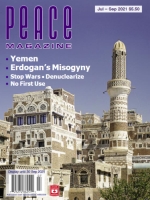
Peace Magazine Jul-Sep 2021, page 12. Some rights reserved.
Search for other articles by Metta Spencer here
Senator Elizabeth Warren (D. Massachusetts) and House Armed Services Committee Chairman Adam Smith (D. Washington) reintroduced this bill: “It is the policy of the United States to to use nuclear weapons first.” This prompted a new campaign that asks President Biden to propose such an agreement to Putin at their Geneva meeting. Current US policy is to use nuclear weapons against an enemy threatening it or its allies against conventional, biological, chemical (or cyber?) attacks.
Still, a disarmament activist may react to this news story by yawning, since No First Use (NFU) bills have been proposed repeatedly in previous Congresses without success. Moreover, we activists favor a much stronger policy: the complete abolition of nuclear weapons, as prescribed in the Treaty on the Prohibition of Nuclear Weapons (TPNW), which entered into force a few months ago. A “No First Use” policy would allow every nuclear country to keep its existing arsenal, which obviously we deplore.
Yet there are excellent grounds for promoting this legislation. Despite the urging of non-nuclear states, not one of the nine nuclear-armed states shows any intention of joining the TPNW or disarming. While we keep demanding that they do so, we must also endorse every feeble half-measure that might reduce the grave current risks.
But Warren and Smith’s bill faces an uphill path, especially in the Senate, and the only basis for optimism about its outcome is that President Biden, while he was vice-president, had expressed favor for that policy, stating that he was “confident we can deter and defend ourselves and our allies against non-nuclear threats through other means.” He is expected to authorize a new Nuclear Policy Review, which will revive the perennial debate.
Only two of the nine nuclear weapons states—India and China—claim to adhere to a NFU policy. Some people discount their claims as “merely declaratory,” but in fact they are credible, for their armed forces are deployed in ways reflecting such a commitment. For example, China keeps its nuclear warheads detached from the matching missiles, which means that they could not be launched quickly. Therefore, when China and India engaged in a minor war on their border last year, no one worried that the fighting might escalate to a nuclear exchange.
Such a reduction of unnecessary fear is the main reason for promoting NFU. AS Smith noted, “The United States should never initiate a nuclear war. This bill would strengthen deterrence while reducing the chance of nuclear use due to miscalculation or misunderstanding. Codifying that deterring nuclear use is the sole purpose of our nuclear arsenal strengthens US National security and would renew US leadership on nuclear non-proliferation and disarmament.”
Here Smith uses a phrase—“sole purpose”—that is meant to be synonymous with NFU but which seems a bit ambiguous. To be sure, every nuclear weapon state asserts that the main purpose of its arsenal is to deter nuclear attack by an adversary, but now some arms control negotiators say that nuclear deterrence should be their sole purpose. They presumably implicitly assume something that others express explicitly—that the sole purpose should be to deter and respond, if the deterrence fails. Literally, however, if only deterrence were legitimate, the nation could not even retaliate in kind after receiving a nuclear attack. No government official promoting “sole purpose” or NFU is proposing such extreme restraint. Indeed, the credibility of deterrence in a situation of NFU requires that a state be able to carry out an effective “second strike” nuclear retaliation. Of course, such a response would likely put an end to human civilization, which is the real reason for preferring TPNW over NFU or “sole purpose” policies.
Still, we should advocate No First Use—not only as an initiative by the United States alone, but as a commitment by all the existing nuclear weapon states. Biden’s administration conceivably could negotiate such an agreement among all nine countries. After all, the nuclear weapons states have already pledged never to use a nuclear weapon against more than 180 other countries—the ones without nuclear weapons—so why not add nine more countries to that list of non-targets?

Peace Magazine Jul-Sep 2021, page 12. Some rights reserved.
Search for other articles by Metta Spencer here